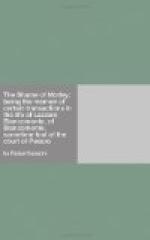She looked at me, her eyes round with inquiry, and a faint smile of uncertainty on her lips.
“Let me confess that your elucidation helps me but little.”
“Ponder it, Madonna,” I urged her. “Substitute Giovanni Sforza for Belshazzar, Cesare Borgia for King Darius, and you have the key to my parable.”
“But is it indeed so? Does danger threaten Pesaro from that quarter?”
“Aye, does it,” I answered, almost impatiently. “The tide of war is surging up, and presently will whelm us utterly. Yet here sits the Lord Giovanni making merry with balls and masques and burle and banquets, wholly unprepared, wholly unconscious of his peril. There may be no hand to write a warning on his walls—or else, as in the case of Babylon, the hand will write when it is too late to avert the evil—yet there are not wanting other signs for those that have the wit to read them; nor is a wondrous penetration needed.”
“And you think then—” she began.
“I think that if you are obdurate with him, he and your brother may hurry you by force into this union. But if you temporise with half-promises, with suggestions that before Christmas you may grow reconciled to his wishes, he will be patient.”
“But what if Christmas comes and finds us still in this position?”
“It will need a miracle for that; or, at least, the death of Cesare Borgia—an unlikely event, for they say he uses great precautions. Saving the miracle, and providing Cesare lives, I will give the Lord Giovanni’s reign in Pesaro at most two months.”
We had halted now, and were confronting each other in the descending gloom.
“Lazzaro, dear friend,” she cried, almost with gaiety, “I was wise to take counsel with you. You have planted in my heart a very vigorous growth of hope.”
We turned soon after, and started to retrace our steps, for she might be ill-advised to remain absent overlong.
I left her on the terrace in a very different spirit from that in which she had come to me, bearing with me her promise that she would act as I had advised her. No doubt I had taken a load from her gentle soul, and oddly enough I had taken, too, a load from mine.
Things fell out as I said they would in far as Giovanni Sforza and Filippo were concerned. Madonna’s seeming amenability to their wishes stayed their insistence, and they could but respect her wishes to let the betrothal be delayed yet a little while. And during the weeks that followed, it was I scarce know whether more pitiable or more amusing to see the efforts that Giovanni made to win her ardently desired affection.
Love has sharp eyes at times, and a dullard under the influence of the baby god will turn shrewd and exert rare wiles in the conduct of his wooing. Giovanni, by some intuition usually foreign to his dull nature, seemed to divine what manner of man would be Madonna Paola’s ideal, and strove to pass himself off as possessed of the attributes of that ideal, with an ardour that was pitiably comical. He became an actor by the side of whom those comedians that played impromptus for his delectation were the merest bunglers with the art. He gathered that Madonna Paola loved the poets and their stately diction, and so, to please her better, he became a poet for the season.




